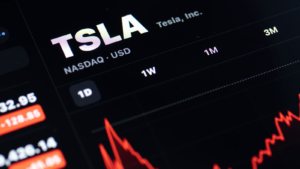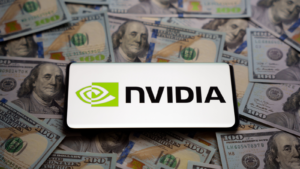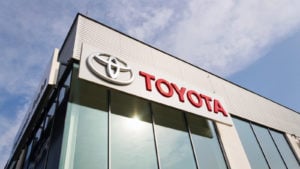The other primary benefit of investing in mega-cap stocks is that they are generally safe. Most of these companies are also blue chip stocks, meaning that they are household names. They tend to have long track records of impressive performance that suggest continued stability. On top of that, they often provide income in the form of dividends. It all suggests stability.
Those are two excellent reasons to consider investing. Let’s look at seven mega-cap stocks that have the potential to double your money within three years.
AMD (AMD)

AMD (NASDAQ:AMD) has emerged as a key challenger in the race for artificial intelligence (AI) chip dominance. Generally speaking, that is the reason investors are so interested in the stock currently. Most investors are simply reacting to the general strong sentiment surrounding the firm to rationalize their investment. Dig a little bit deeper, and it’s easy to understand why AMD is indeed a strong investment but also one that can triple within the next few years.
The logic for believing that statement can be found in comments made by CEO Lisa Su. Late last year Sue predicted that the market for AI data center chips could reach $400 billion by 2027. Analysts from New Street research noted that even if data center spending only reaches half that target in that time frame, it would correlate to a potential quadrupling of AMD’s price, which was roughly $130 at that time.
That would put its price in the low $500s, which is roughly triple its current price.
ASML (ASML)

The arithmetic that governs a potential doubling in ASML (NASDAQ:ASML) stock by 2027 is fairly straightforward. Let’s start by running through that quickly.
Analysts currently believe that ASML shares could rise approximately 25% in the next year. That Would bring prices to $1,215 in 2025. Let’s imagine that things continue to go well and progress at the same pace for the next two years. That would bring prices just above $1,500 in 2026 and near $1,900 by 2027. That equates to a doubling from its current price.
It’s also perfectly logical to believe that that is possible, given the strength of ASML’s products and their relation to current trends. It’s then one of those mega-cap stocks to consider.
ASML is the leading chip tool maker at the leading edge of the technology. the company enjoys a monopoly over extreme ultraviolet lithography (EUV). That technology is used to etch patterns on the most complex chip wafers and is indispensable in relation to artificial intelligence. If the AI trend continues as it has, it’s entirely likely that ASML doubles in that timeframe.
Adobe (ADBE)

Adobe’s (NASDAQ:ADBE) stock, like that of so many other companies on this list, is rising and falling on the potential of artificial intelligence. The emergence of artificial intelligence is the reason to believe Adobe could double from here.
Now is arguably an excellent time to stake a position in the stock. Adobe is well known for Photoshop and other graphics tools that position the firm well in the generative AI race. That’s the primary reason that the stock did so well last year. However, Adobe was unable to monetize it to the level investors had expected.
The result is that Shares currently trade for $485. That follows a strong pullback that began in February. I’d argue that it’s an overreaction to the overreaction that created the hype in the first place. Adobe did not end up buying Figma which many believed was a bad deal to begin with. That’s positive news. Adobe just has to figure out how to better monetize Firefly. There’s a huge opportunity, given the demand for AI products in content creation. Adobe can easily double from its current price point by 2027. This makes it one of those mega-cap stocks for investors to consider.
Tesla (TSLA)

Many investors are looking for reasons to invest in Tesla (NASDAQ:TSLA) stock at the moment. there’s a clear contrarian opportunity for those who can find optimism among all the negativity. Shares currently trade for $170. So, it’s easy to see why they have the potential to double in the next few years, given that they traded above $400 just before quantitative tightening set in.
Don’t be fooled, there is plenty of reason for negativity at the moment. Tesla just released its Q1 delivery figures which were disappointing. Elon Musk’s company delivered 386,810 vehicles during the first quarter representing an 8.6% decline year over year. It was the first time since the pandemic began that deliveries fell. Those delivery figures were also far below numbers analysts had been expecting.
Beyond that, competition is heating up in the EV sector. Tesla won’t benefit as strongly from its early competitive advantages moving into the future.
However, it isn’t all doom and gloom in the near term. Shipping disruptions in the Red Sea were partially to blame for the lower-than-expected delivery numbers. Furthermore, at some point, the Chinese economy will turn around, and demand will rebound. That should propel Tesla higher in the coming year or so.
Nvidia (NVDA)

Despite its strong growth, it’s unlikely to surprise many that Nvidia (NASDAQ:NVDA) stock has the potential to double from here.
Let’s assume two things; one, Nvidia continues to enjoy a dominant position in relation to AI for the next few years, two, strong metrics continue to hold over that period. Under that scenario Nvidia can double by 2027.
Nvidia’s sales are expected to be somewhere in the neighborhood of $102 billion dollars in 2025, per consensus estimates. Some Wall Street analysts believe that revenues could reach $300 billion by 2027 on AI chip sales alone. Nvidia shares would easily double under that scenario and, more realistically, would triple in value, assuming valuations hold steady. Growing from $102 billion in sales in 2025 to $300 billion by 2027 makes that potential very obvious.
More likely, though, metrics like the P/E ratio would rise even higher if Nvidia sales grow that quickly. Thus, share prices would more than triple if sales grow to that height by 2027.
Toyota (TM)

Could Toyota (NYSE:TM) stock eventually emerge as the biggest winner in the EV revolution? The answer is a resounding: “Yes!”
Toyota has been building ultra-reliable, somewhat uninspiring vehicles for many decades. The company’s nature is to default to data suggestive of reliability in guiding its decision processes. It’s highly likely that Toyota knew that a pure EV strategy was not the way forward based on such data.
That got Toyota in trouble relative to other big automobile manufacturers that adopted the EV craze to their detriment. Just look at what has happened to Ford (NYSE:F) and GM (NYSE:GM). Their decision to invest heavily in pure EV technology hasn’t paid off. Toyota believes that a hybrid first strategy is The logical path toward EV profits.
As the EV hype has died down, Toyota suddenly looks brilliant. The point here is not for Toyota to say I told you so but rather that the company’s slower, iterative approach will win in the end. That’s why I believe the company will ultimately emerge as one of the big winners in the EV race over time. Toyota is likely to find profitability from EVs without sinking unnecessary billions of dollars into the technology in an effort to skip the necessary steps.
Alibaba (BABA)

It’s no secret that many investors are betting on Alibaba (NASDAQ:BABA) stock to double in the next few years. Share prices have fallen by more than 75% since late 2020. During that period, Alibaba has gone from a presumed competitor with Amazon (NASDAQ:AMZN) to something much less flattering.
In any case, it’s very easy to find a narrative in which Alibaba doubles in the next few years. Let’s do some simple arithmetic that proves the possibility is entirely real. Alibaba’s price/sales ratio over the last 10 years has a median of 8.34. However, it currently stands at 1.43.
It doesn’t seem likely that it’ll rise to the median anytime soon: the Chinese economy continues to experience difficulty. Alibaba’s shares are unlikely to pop for that reason. However, imagine that the P/S ratio doubles. That would correlate to a doubling of price and more, given that sales are predicted to continue growing, albeit at a slower pace. If the Chinese economy rebounds over the next few years, it’s all entirely possible. This makes it one of those mega-cap stocks to buy.
On the date of publication, Alex Sirois did not have (either directly or indirectly) any positions in the securities mentioned in this article. The opinions expressed in this article are those of the writer, subject to the InvestorPlace.com Publishing Guidelines.
Alex Sirois is a freelance contributor to InvestorPlace whose personal stock investing style is focused on long-term, buy-and-hold, wealth-building stock picks. Having worked in several industries from e-commerce to translation to education and utilizing his MBA from George Washington University, he brings a diverse set of skills through which he filters his writing.
